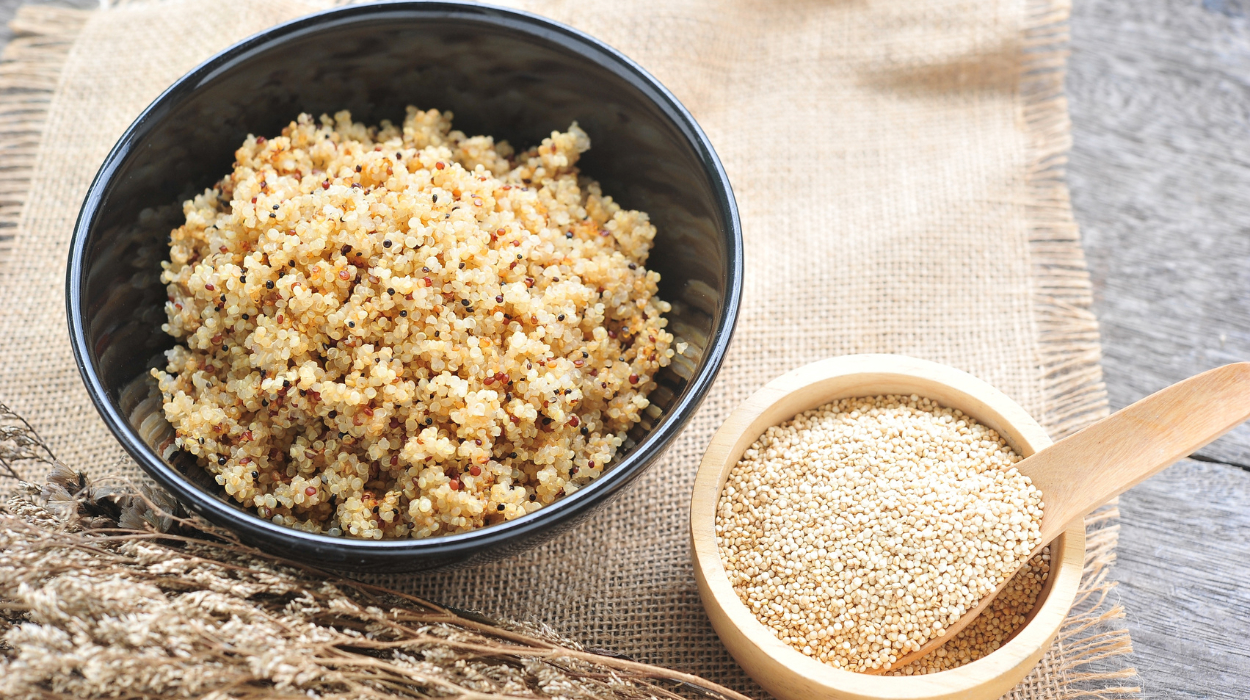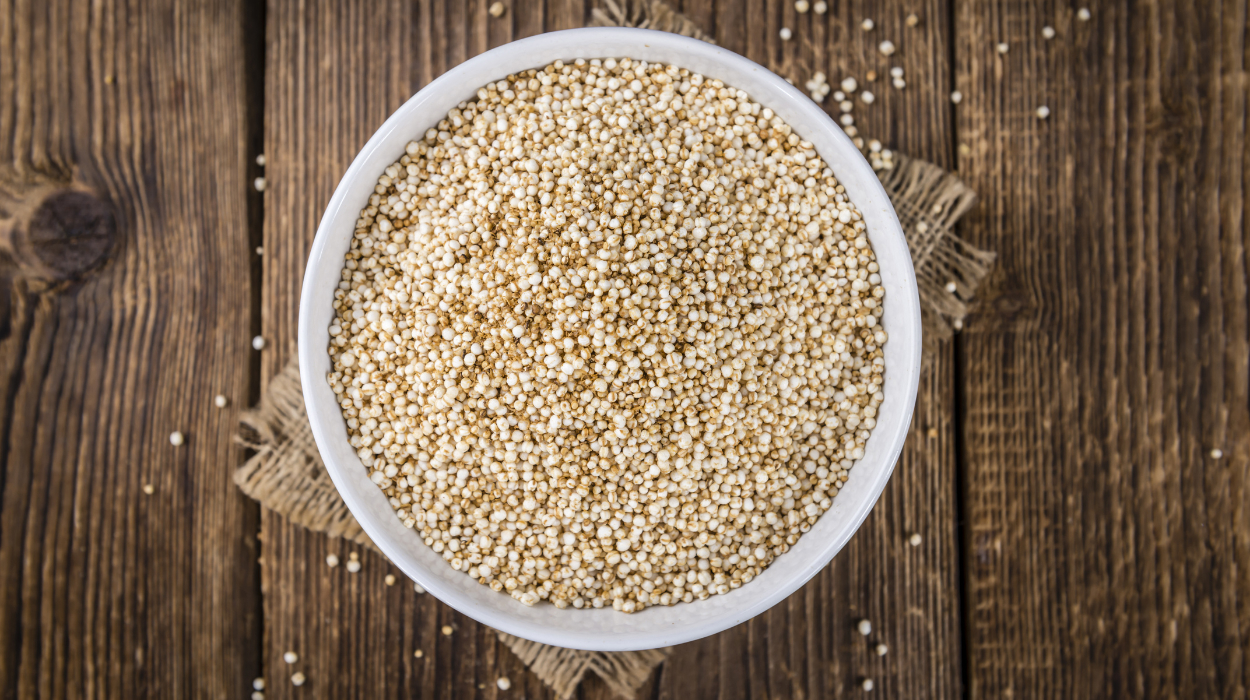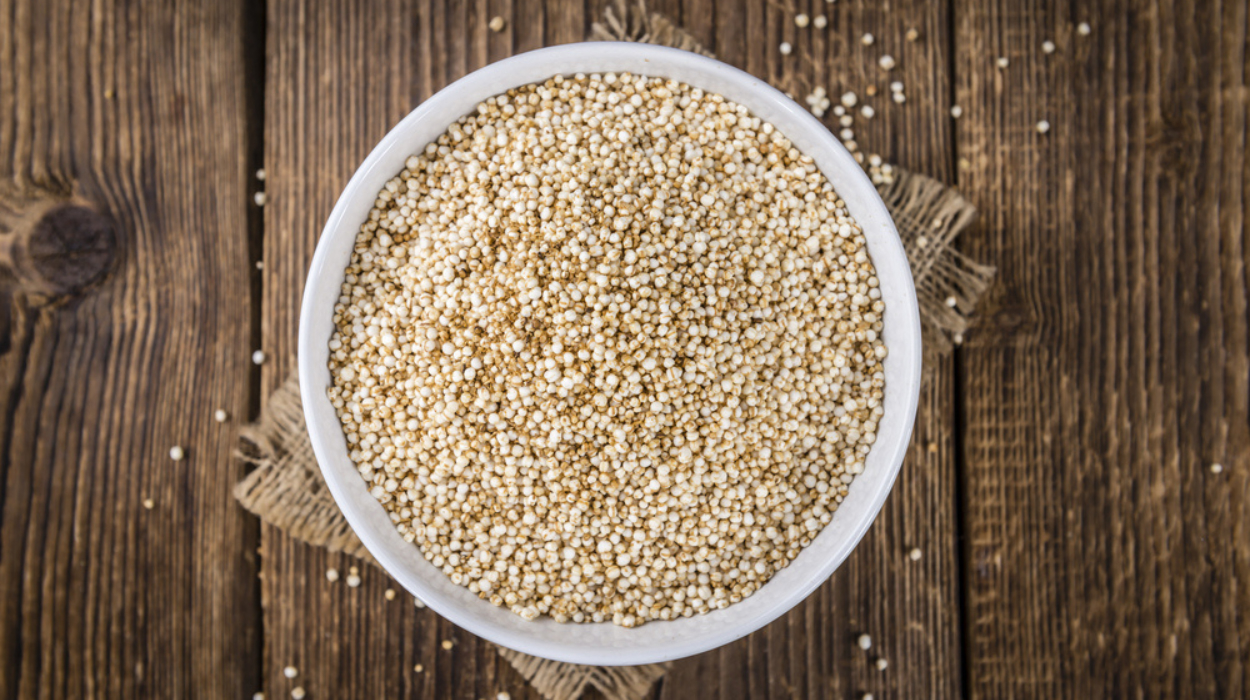Due to its high nutritional content, quinoa has marked its place as a superfood amongst health enthusiasts. But is quinoa good for weight loss? Or is it amongst the list of foods to avoid to lose weight?
While often considered a grain, quinoa[1] is actually a seed cultivated as far back as 5000-3000 BC. However, it wasn’t until the past two decades that quinoa took the world by storm. By 2013, production and consumption of quinoa had increased exponentially. And luckily, there are loads of ways to add this plant-based food to your diet.
So, is eating quinoa good for losing weight? In this article, we dig into whether quinoa is good for weight loss and how you can enjoy it as part of your daily diet.
Is Quinoa Good For Losing Weight?
Yes, quinoa can be part of a healthy weight loss plan. It contains fiber and protein, increasing satiation and keeping you full for hours. It also has other health benefits, including helping with blood sugar management. This can also support weight loss efforts and overall health.
Is Quinoa Good For Weight Loss?

Quinoa seeds offer a filling, tasty, healthy alternative to white rice or pasta. They are also a nutritional powerhouse, including healthy weight-loss nutrients like fiber and protein.
The nutritional value of one cooked cup of white quinoa[2] include:
- 222 calories.
- 8.1 grams of protein.
- 3.5 g of fat.
- 39.4 g of carbohydrates.
- 5.1 g of fiber.
The nutritional profile of cooked quinoa also includes smaller amounts of the essential minerals calcium, iron, magnesium, phosphorous, potassium, sodium, zinc, copper, manganese, and selenium, as well as B vitamins like thiamine, riboflavin, niacin, folate, choline, and more.
So, is quinoa good for losing weight? And, if so, how?
It Keeps You Fuller For Longer
Due to its high dietary fiber and protein content, quinoa can help keep food cravings at bay and, thus, reduce one’s calorie intake.
One 2023 study explored the relationship between eating over 40 grams of fiber[3] from whole foods daily and weight loss. Researchers concluded that increased fiber intake was associated with greater weight loss.
Another recent study concluded that increased dietary fiber[4] promotes weight loss and even increased adherence to a low-calorie diet. Fiber helps with weight loss by enhancing satiation, keeping one full for hours afterward — similar to protein.
In a 2021 study consisting of 60 obese women aged 20-45 years old, researchers suggested that a high-protein diet results in greater weight loss.[5] It further led to improvements in insulin resistance and other inflammatory markers.
However, it’s worth noting that healthy weight loss depends on many different factors. Even taking a fat burner or other diet pills likely won’t lead to significant weight loss without other lifestyle changes.
Beyond a healthy eating plan, sustainable weight loss often requires regular exercise, stress management techniques, and other lifestyle changes. At the same time, try to avoid making too many changes at once. A gradual approach is always best as this can help reduce feelings of overwhelm.
It’s Beneficial For The Gut
Due to quinoa being high in fiber, it also has ample benefits for the gut. A healthy gut[6] is associated with optimal hormonal secretion and low inflammatory markers — which support healthy weight loss and maintenance.
Low dietary fiber[7] is associated with detrimental impacts on the gut microbiome, including increasing obesity and diabetes risks. Thus, eating fiber-rich foods, like quinoa, may further your weight loss journey.
It May Help Lower Inflammation
Pro-inflammatory diets[8] are linked to higher annual weight gain and an increased risk of obesity. While a healthy gut can go a long way here, manganese, a nutrient found in quinoa, may also lower inflammation.
A 2020 study determined that higher dietary manganese intake[9] is linked with lower diabetes risk and lower inflammatory biomarkers for postmenopausal women. Yet, more studies are needed on other groups of the general population.
It Goes Well With Vegetables And Lean Meat
Research indicates that a diet based around whole food[10] plant sources may lead to increased weight loss. This is likely due to many plant foods being low in calories and high in many essential nutrients, like fiber.
Since quinoa is derived from a plant, it can be part of this holistic eating approach. Quinoa is a great addition to salads, stir-fries, and more. It also makes a wonderful option to have with lean meats, like chicken. Quinoa can be included as part of a gluten-free diet, making it particularly useful for those with celiac disease.
This grain also has a low glycemic index,[11] meaning it raises blood sugar slowly, avoiding sugar highs and crashes. Healthy blood sugar levels can help prevent snacking and promote a healthy weight.
How Much Quinoa Per Day To Lose Weight?

Packed with plenty of essential nutrients and amino acids, the amount of quinoa daily depends on various factors. Most studies seem to incorporate anywhere from half a cup of quinoa to two cups daily.
However, the amount you consume may depend on your body weight and weight loss goals, which further helps determine:
- How much fiber per day to lose weight?
- How much carbs per day to lose weight?
- How much protein you should eat?
Consuming 1.2 grams of protein[12] per kilogram of body weight is recommended for weight loss in healthy adults. This is easy to measure; all you need is your weight in kilograms. Then multiply this number by 1.2 to get your daily protein amount.
While your macronutrient amounts matter for weight loss, calories do, too. The required calorie deficit to lose weight again depends on your goals and current body weight. One pound of fat is equivalent to 3500 calories. This means to lose one pound; it’s necessary to have a calorie deficit of 3500 calories through exercise and dietary restriction.
For safe, sustainable weight loss, experts recommend aiming to lose 1-2 pounds of weight per week,[13] with a calorie deficit of 500-1000 calories[14] daily.
Which Quinoa Is Best For Weight Loss?
The three main types of quinoa include red,[15] black,[15] and white. White quinoa contains the lowest amount of calories. Yet, black quinoa has the highest amount of fiber and protein, which may lead to increased satiation and reduced food cravings.
Like many plant foods, all types of quinoa can be part of a healthy weight loss plan. Depending on your exact diet plan, you can determine what type of quinoa fits in with your daily macronutrients and calories each day.
It can also help to mix up what type of quinoa you incorporate to avoid boredom. All types of quinoa are good sources of protein and fiber, which, as per the above, can support your weight loss efforts.
Quinoa is also ultra-easy to add to your daily diet, which we will take a closer look at below.
If you tend to go over your allotted daily calories, drinking more water to lose weight may further help you reach your goals. Consider having a glass or two of water before each meal,[16] as this may reduce your calories.
How To Eat Quinoa To Lose Weight?
From breakfast to lunch and dinner, there are many enjoyable ways to eat quinoa daily, including:
- As part of a healthy meal consisting of lean meat and vegetables.
- Adding it to smoothies or oatmeal in the morning.
- Making your own granola at home for healthy weight loss snacks.
- Popping it like popcorn for a different kind of snack.
- Incorporating it as part of your salad bases, along with leafy greens.
- Enjoying it in place of rice or pasta.
- Adding it to your yogurt parfait.
- Making quinoa pancakes or waffles.
- Discovering new and healthy quinoa cookie recipes.
- Using it in stir-fries.
- Adding it to soups instead of noodles or rice.
Quinoa is a very versatile seed, so get creative in the kitchen. Eating healthy doesn’t have to be overly complicated or boring. For increased satiation, adding some protein, such as chicken or turkey, with any quinoa you consume can help enhance this.
Conclusion
So, is quinoa good for dieting?
Well, if you’re having trouble finding foods to promote weight loss, quinoa might be a suitable option. It adds more protein and fiber to your diet and reduces food cravings. It’s also a great substitute for refined grains and pasta.
Unlike most other plant foods, quinoa[17] is also a complete protein. This means that it contains all of the nine essential amino acids. This not only can further your weight loss goals but also support your overall health.
Frequently Asked Questions
As part of a healthy weight loss plan, including exercise and other lifestyle changes, quinoa can help you lose weight and, thus, belly fat.
Yes, as part of a balanced and healthy diet, you can enjoy quinoa every day. You can even use it to replace refined grains, such as white rice or pasta.
Quinoa contains a high carbohydrate content which can contribute to the high caloric amount. Yet, this doesn’t mean that, with the right approach, quinoa can’t be part of a healthy weight loss plan.
Due to higher protein and fiber, quinoa is likely to keep you fuller for longer when compared to rice. In turn, it can help you lose weight due to its satiation.
Quinoa is, technically, a high-carb food. Yet, it’s also a great source of protein and fiber. This means it can enhance satiation and will likely not lead to huge blood sugar spikes.
If you’re following a low-carb or keto diet, quinoa is unlikely to be an appropriate food. Despite being high in fiber and protein, quinoa is also considered high-carb.
 Evidence Based
Evidence Based
